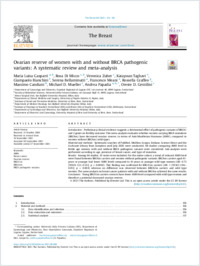Ovarian reserve of women with and without BRCA pathogenic variants : a systematic review and meta-analysis
- Gasparri, Maria Luisa ORCID Department of Gynecology and Obstetrics, Ospedale Regionale di Lugano EOC, Lugano, Switzerland ; Faculty of Biomedical Sciences, Università della Svizzera italiana, Switzerland
- Di Micco, Rosa Breast Surgical Unit, San Raffaele University Hospital, Milan, Italy ; Department of Clinical Medicine and Surgery, University of Naples Federico II, Naples, Italy
- Zuber, Veronica Breast Surgical Unit, San Raffaele University Hospital, Milan, Italy
- Taghavi, Katayoun Institute of Social and Preventive Medicine, University of Bern, Bern, Switzerland
- Bianchini, Giampaolo Department of Medical Oncology, San Raffaele University Hospital, Milan, Italy
- Bellaminutti, Serena Department of Gynecology and Obstetrics, Ospedale Regionale di Lugano EOC, via tesserete 46, Lugano, Switzerland
- Meani, Francesco Department of Gynecology and Obstetrics, Ospedale Regionale di Lugano EOC, via tesserete 46, Lugano, Switzerland
- Graffeo, Rossella Oncology Institute of Southern Switzerland (IOSI), Bellinzona, Switzerland
- Candiani, Massimo Department of Gynecology and Obstetrics, San Raffaele University Hospital, Milan, Italy
- Mueller, Michael D. Department of Obstetrics and Gynecology, University Hospital of Bern and University of Bern, Bern, Switzerland
- Papadia, Andrea Department of Gynecology and Obstetrics, Ospedale Regionale di Lugano EOC, via tesserete 46, Lugano, Switzerland ; Faculty of Biomedical Sciences, Università della Svizzera italiana, Switzerland
- Gentilini, Oreste D. Breast Surgical Unit, San Raffaele University Hospital, Milan, Italy
- 2021
Published in:
- The Breast. - 2021, vol. 60, p. 155-162
English
Introduction: Preliminary clinical evidence suggests a detrimental effect of pathogenic variants of BRCA1 and 2 genes on fertility outcome. This meta-analysis evaluates whether women carrying BRCA mutations (BRCAm) have decreased ovarian reserve, in terms of Anti-Muellerian Hormone (AMH), compared to women without BRCAm (wild-type).
Material and methods: Systematic searches of PubMed, Medline, Scopus, Embase, Science Direct and the Cochrane Library from inception until July 2020 were conducted. All studies comparing AMH level in fertile age women, with and without BRCA pathogenic variants were considered. Sub-analyses were performed according to age, presence of breast cancer, and type of mutation. Results: Among 64 studies, 10 series were included. For the entire cohort, a trend of reduced AMH level were found between BRCAm carriers and women without pathogenic variants. BRCAm carriers aged 41- years or younger had lower AMH levels compared to 41-years or younger wild type women (OR: 0.73 [95%CI-1.12;-0.35]; p 1⁄4 0.0002). This finding was confirmed for BRCA1m carriers (OR: 1 [95%CI-1.96;- 0.05]; p 1⁄4 0.004) whereas no difference was observed between BRCA2m carriers and wild type women. The same analysis on breast cancer patients with and without BRCAm achieved the same results. Conclusion: Young BRCA1m carriers seem to have lower AMH level compared with wild type women and therefore a potential decreased ovarian reserve.
Material and methods: Systematic searches of PubMed, Medline, Scopus, Embase, Science Direct and the Cochrane Library from inception until July 2020 were conducted. All studies comparing AMH level in fertile age women, with and without BRCA pathogenic variants were considered. Sub-analyses were performed according to age, presence of breast cancer, and type of mutation. Results: Among 64 studies, 10 series were included. For the entire cohort, a trend of reduced AMH level were found between BRCAm carriers and women without pathogenic variants. BRCAm carriers aged 41- years or younger had lower AMH levels compared to 41-years or younger wild type women (OR: 0.73 [95%CI-1.12;-0.35]; p 1⁄4 0.0002). This finding was confirmed for BRCA1m carriers (OR: 1 [95%CI-1.96;- 0.05]; p 1⁄4 0.004) whereas no difference was observed between BRCA2m carriers and wild type women. The same analysis on breast cancer patients with and without BRCAm achieved the same results. Conclusion: Young BRCA1m carriers seem to have lower AMH level compared with wild type women and therefore a potential decreased ovarian reserve.
- Collections
- Language
-
- English
- Classification
- Medicine
- License
- Open access status
- gold
- Identifiers
-
- DOI 10.1016/j.breast.2021.09.006
- ARK ark:/12658/srd1326713
- Persistent URL
- https://n2t.net/ark:/12658/srd1326713
Statistics
Document views: 169
File downloads:
- Gasparri_2020_Else_breast: 165
